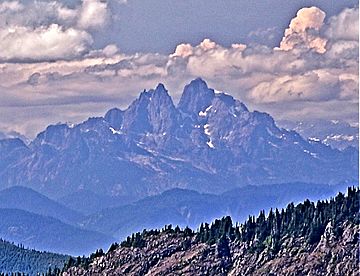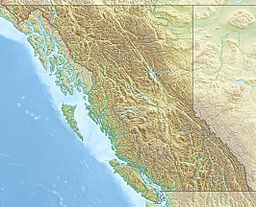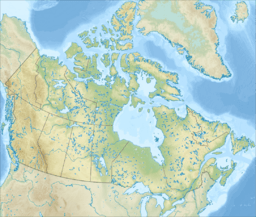Mount Judge Howay facts for kids
Quick facts for kids Mount Judge Howay |
|
|---|---|
 |
|
| Highest point | |
| Elevation | 2,262 m (7,421 ft) |
| Prominence | 1,627 m (5,338 ft) |
| Listing | |
| Geography | |
| Location | Lower Mainland, British Columbia, Canada |
| Parent range | Garibaldi Ranges |
| Topo map | NTS 92G/09 |
| Climbing | |
| First ascent | 1921 Tom Fyles; E. Fuller; H. O'Conner |
| Easiest route | navigation, technical rock climbing |
Mount Judge Howay is a tall mountain with two main peaks. It was first called the Snow Peaks, a name that also included Mount Robie Reid. This mountain is found about 10 kilometers (6 miles) from the Central Fraser Valley. It is also very close to the north end of Stave Lake.
Mount Judge Howay is one of the highest mountains in its area. You can often see it from other peaks around Vancouver, British Columbia. It sits inside the eastern part of Golden Ears Provincial Park. Another mountain, Mount Robie Reid, is just to its south.
Naming the Mountain
Mount Judge Howay got its name from Frederic W. Howay. He was a famous judge and an expert on the history of British Columbia.
Just southwest of Mount Judge Howay is Mount Robie Reid. This mountain is named after Robie Lewis Reid. He was a lawyer and historian who worked with Frederic W. Howay for many years.
Getting to the Peak
Mount Judge Howay is a very challenging mountain to climb. This is because it is far away and has difficult terrain.
To reach it from the southeast, climbers must first use a canoe to get to the end of Stave Lake. Then, they walk along old logging roads. After that, they need to cross the Stave River. Finally, they climb through a very steep Pacific Coast rainforest. They also have to find their way through areas with many cliffs.
Mountain Weather
Mount Judge Howay is in a marine west coast climate zone. This type of climate is common in western North America.
Most weather systems start over the Pacific Ocean. They then move east towards the Coast Mountains. When these weather systems hit the mountains, they are forced to rise. This causes them to drop their moisture as rain or snow.
 | Anna J. Cooper |
 | Mary McLeod Bethune |
 | Lillie Mae Bradford |



